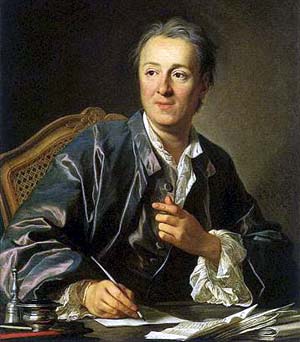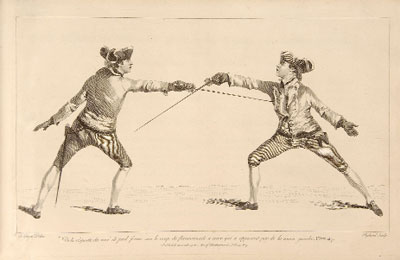[Partly edited
October 23, 2013]
18th Century Thinkers Part I
The Philosophes
I. Introduction
The great thinkers of the 18th century were proud of their many
achievements. Most would have agreed with Kant in viewing their
century as an age of "aufklarung," enlightenment. But they would
also have agreed with Kant's contention that, while is some ways the
18th century was an age of enlightenment, it was not a very enlightened
age. Still, dispite disappointment with the results of
"enlightened" changes made by rulers from Frederick the Great to Joseph
II to Catherine the Great, the great thinkers of the 18th century were
optimistic. For them, there was one great hope. Christian
revival? Not at all. An outbreak of an Age of Aquarius? No,
not that either.
The great thinkers of the 18th century turned to reason for
answers to mankind's problems. They thought reason would end
poverty, war, and injustice. Reason would help them create they
ideal political and social system. Reason would give them the
ultimate answers in religion. They sometimes carried their faith
in reason to an irrational extreme.
Those who thought this way are sometimes grouped together under the
generic name "philosophe." Philosope is just the French word for
philosopher, but we use it, not just for any old philosopher, but for a
group of (mostly French) thinkers in the 18th century. Among
them, Denis Diderot.
II. Diderot (Existing knowledge solves problems)
 Diderot is an excellent example of the philosophes faith
in human reaons. He believed that many human problems could be solved
throught the application of existing knowledge. We already had
the knowledge to solve many human problems. So why hadn't the
problems been solved? Partly, because too few people had that
knowledge and because nobody had it all. Diderot thought that if
existing knowledge could be gathered together and then disseminated as
widely as possible, all sorts of things would get better.
Diderot is an excellent example of the philosophes faith
in human reaons. He believed that many human problems could be solved
throught the application of existing knowledge. We already had
the knowledge to solve many human problems. So why hadn't the
problems been solved? Partly, because too few people had that
knowledge and because nobody had it all. Diderot thought that if
existing knowledge could be gathered together and then disseminated as
widely as possible, all sorts of things would get better.
But for Diderot, this was going to be something more than a
dream. He gathered together more the 200 experts in various
fields. They worked for more than 20 years to put together the
first great French Encyclopedia. The encyclopedia was published
in (ultimately) more than two dozen beautifullly illustrated
volumes, volumes with information on all sorts of subjects.
The Encylopedia included articles on science: useful in helping
scientists in one area see what scientists in other areas were working
on. It was a great help in avoiding, the "reinvention
of the wheel"
sort of thing that happens when scientific discoveries aren't readily
availalble to all those interested.
The Encylopedia included articles on medicine--a good source for
getting a "second opinion" on various ailments and their
treatment. It likewise included articles on surgery: articles so
good that one could perform state-of-the-art surgery by following the
encyclopedia instructions. Plus, there was information that might
save your life, particularly the warning that one shouldn't have
surgery if there was an alternative. In the days before
antiseptic surgery, this was a mighty important piece of advice!
The Encyclopedia included lots of information on technology: on mining,
rope-making, printing, textile manufacture, etc. The information
was so good that many complained: Diderot was giving away trade
secrets, techniques that gave certain manufacturers advantages over
their competitors.
The Encylopedia even included information on sports (e.g., tennis) and,
once again there was information that might save your life. The
fencing  article says, "Never
make a thrust without being prepared to parry."
article says, "Never
make a thrust without being prepared to parry."
The Encylopedia has articles on everything from marriage to
philosophy to law. And (best of all!), the Encyopedia included
some very fine articles dealing with various aspects of
history, particularly important (Diderot thought) as a tool for
fighting ingnorance and supersition.
[Glancing through some of these translations of Encylopedia
articles will give you a great feel for the way the Philosophes
approached things. Do take a look!]
III. Condorcet (Education solves our problems)
Another example of the philosophes' faith in reason, the work of
Antoine Nicolas de Condorcet. Condorcet was an oustanding French
mathematician, famous for his essay, "The Progress of the Human
Mind." Condorcet thought that, through education, we would
improve our understanding and be able to solve virtually all problems.
Ultimately, the "Progress of the Human Mind" would lead to an end to
the following:
1. An end to social inequality. Although a nobleman
himself, Condorcet thought it absurd for privileges to be allocated
simply on the basis of family origins. Education would make
people see this absurdity, and social inquality would come to an
end.
2. An end of inequality between
sexes. Give women the same education as men, and no doors would
be barred to them.
3. An end of economic inequality. People would see the
absurdity of distributing wealth is such a way that some had more than
they could use in a hundred lifetimes while others went to bed
hungry. And there wouldn't be any reason for economic inequality
anyway. Edcuation would lead to increased economic production,
and, once there was more than enough of every good thing for everybody,
what reason would there be to try to get more than one's fair share?
4. An end to war. Education would let us see the
unnecessary waste of warfare, and, once we saw this,wars would end.
5. An end of imperialism. The European countries would see
the injustice and inefficiency of their attempts to dominate other
peoples and leave them alone. And, ultimately, the countries of
the rest of the world would surpass Europe, because they could learn
from European mistakes.
6. An end of disease and
(almost)
death. Through education, medical discoveries would eventually
solve every human health problem--even old-age-related problems,
and we'd die only as a result of unfortunate accident.
Ultimately, education would give us a perfect society. Men would forget
their greed, fear and misery and live in an "Elysium created by reason."
And, of course, Condorcet was absolutlely right--or, maybe not.
Some would argue that education has already done much of what Condorcet
had hoped and that, ultimately, it will do still more. Others
would argue that Condorcet has missed something important about human
nature: he's more optimistic than he should be.
[In class, I introduce Jean-Jacques Rousseau,
telling some stories from his "Confessions." This is basically
background material. You need only to know that, by his own
admission, Rousseau was, in some ways, not a very nice man. See
the next link for Rousseau's political and social ideas: the things I
*really* want you to understand. Reading through Rousseau's Ribbon Story will give
you a feeling for Rousseau's character and his writing style.]
 Diderot is an excellent example of the philosophes faith
in human reaons. He believed that many human problems could be solved
throught the application of existing knowledge. We already had
the knowledge to solve many human problems. So why hadn't the
problems been solved? Partly, because too few people had that
knowledge and because nobody had it all. Diderot thought that if
existing knowledge could be gathered together and then disseminated as
widely as possible, all sorts of things would get better.
Diderot is an excellent example of the philosophes faith
in human reaons. He believed that many human problems could be solved
throught the application of existing knowledge. We already had
the knowledge to solve many human problems. So why hadn't the
problems been solved? Partly, because too few people had that
knowledge and because nobody had it all. Diderot thought that if
existing knowledge could be gathered together and then disseminated as
widely as possible, all sorts of things would get better. article says, "Never
make a thrust without being prepared to parry."
article says, "Never
make a thrust without being prepared to parry."